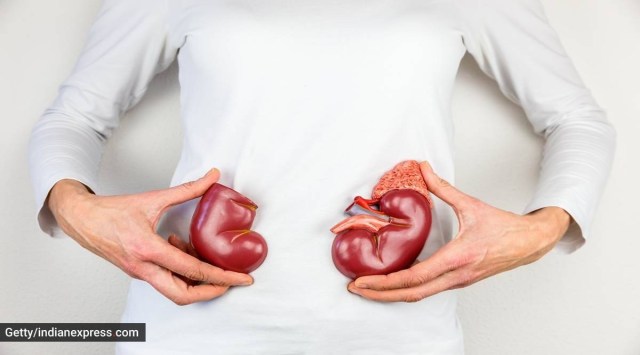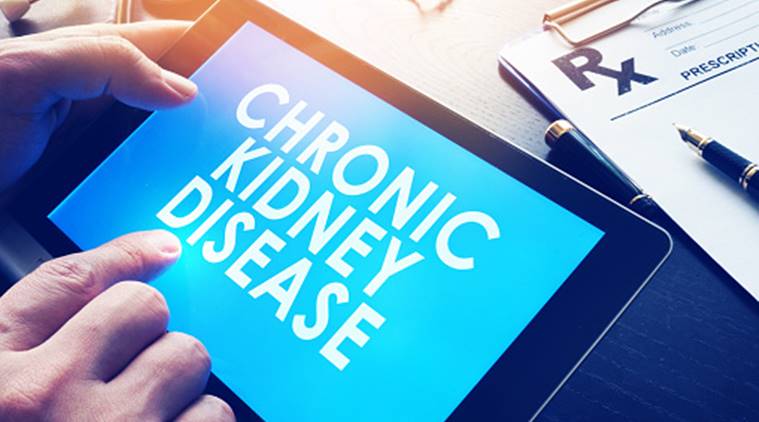- India
- International
Study associates kidney problems with long Covid; experts share symptoms to look out for
"People should get screened and look for percentage of kidney function – eGFR and the amount of protein leakage in urine," said Dr Sanjeev Gulati
 Here's what to consider about kidney health. (Source: Getty Images/Thinkstock)
Here's what to consider about kidney health. (Source: Getty Images/Thinkstock)A new study published in the Journal of the American Society of Nephrology has found that hospitalised Covid patients, and even those with mild symptoms, are likely to experience lingering kidney damage, and end-stage kidney disease (ESKD). Primarily a respiratory infection, experts have often stressed on how it also invades other vital organs and their functioning.
Study researchers at the Veterans Affairs St. Louis Health Care System and Washington University analysed federal health data to gauge the risk of kidney dysfunction and disease, one of the top causes of death in the United States. Since kidney disease tends to present no symptoms, the National Kidney Foundation estimates that 90 per cent of the 37 million Americans who have it are unaware of their condition.
Agreed Dr Sanjeev Gulati, director, Nephrology and Kidney transplant, Fortis Hospital, Vasant Kunj and pointed out how kidney disease is a silent disease – “where you can lose up to 70 to 80 percent of all kidney function without even realising because there are no symptoms”.
Notably, people already suffering from kidney-related issues have almost 30 per cent higher chances of progressing to chronic kidney diseases, said Dr Sudeep Sachdev, senior consultant and clinical Lead, Nephrology and Renal Transplant, Narayana Superspeciality Hospital Gurugram.
Why does it happen?
According to the study, Covid-19 is associated with increased risk of post-acute sequelae involving pulmonary and extrapulmonary organ systems — referred to as long Covid. However, a detailed assessment of kidney outcomes in long Covid is not yet available, mentioned the September 2021 study which was conducted from March 1 2020 to March 15, 2021 in a cohort of 1,726,683 US Veterans including 89,216 30-day Covid-19 survivors and 1,637,467 non-infected controls.

Long Covid is the condition where people experience persistent new symptoms a month or more after the infection.
“People who were hospitalised for Covid-19 or needed ICU care are at the highest risk,” senior author Ziyad Al-Aly, MD said in a Washington University press release. “But the risk is not zero for those who had milder cases. In fact, it’s significant. And we need to remember that we don’t yet know the health implications for long haulers in the coming years.”
Also, incidence of Acute Kidney Injury or AKI, where kidneys suddenly stop working properly, in Covid-19 patients varies widely, but estimates range from 2.1 to 29 per cent, said Dr Sachdev. “The exact mechanism of kidney involvement is although unclear, sepsis may lead to cytokine storm syndrome or direct cellular injury may occur due to the virus invasion leading to acute tubular necrosis or tubulointerstitial nephritis,” he mentioned.
 Chronic kidney disease can lead to kidney failure. (Source: Getty Images)
Chronic kidney disease can lead to kidney failure. (Source: Getty Images)
Here’s what experts suggest for those recovering from long Covid
Patients who were treated at home with mild Covid illness may also develop some kidney problem but may not show significant symptoms. This is why, always look out for signs like not peeing enough, swelling in ankles, legs, and around eyes, tiredness, shortness of breath, feeling confused, nausea, seizures or coma, chest pressure or pain, said Dr Abhishek Subhash, consultant, internal medicine at Bhatia Hospital.
Signs
According to Dr Subhash, high levels of protein in the urine, and abnormal blood work are signs to look out for. “The virus itself infects the cells of the kidney. Kidney cells have receptors that enable the new coronavirus to attach to them, invade, and make copies of itself, potentially damaging those tissues. Similar receptors are found on cells of the lungs and heart, where the new coronavirus has been shown to cause injury,” he said.
What precautions need to be taken?
Experts point out the need for “early intervention“. All patients should regularly follow-up with their physician and perform routine creatinine test to determine proper function of the kidneys, Dr Subhash told indianexpress.com. However, since kidneys of patients with chronic conditions like diabetes and high blood pressure are already functioning at a lower capacity, specific treatments, as per the physician concerned, may need to be advised, he noted.
Dr Gulati said that people should get screened and look for percentage of kidney function – eGFR and the amount of protein leakage in the urine.
“Early intervention and treatment can cure the disease and mitigate its effects on the body. There are multiple problems occurring during post-Covid. Thus, it is quintessential to have regular health checkups and follow up with a specialist up to six months post-Covid,” said Dr Sachdev.
📣 For more lifestyle news, follow us on Instagram | Twitter | Facebook and don’t miss out on the latest updates!
May 13: Latest News
- 01
- 02
- 03
- 04
- 05

























